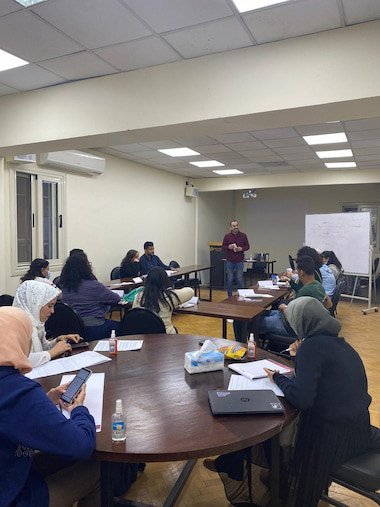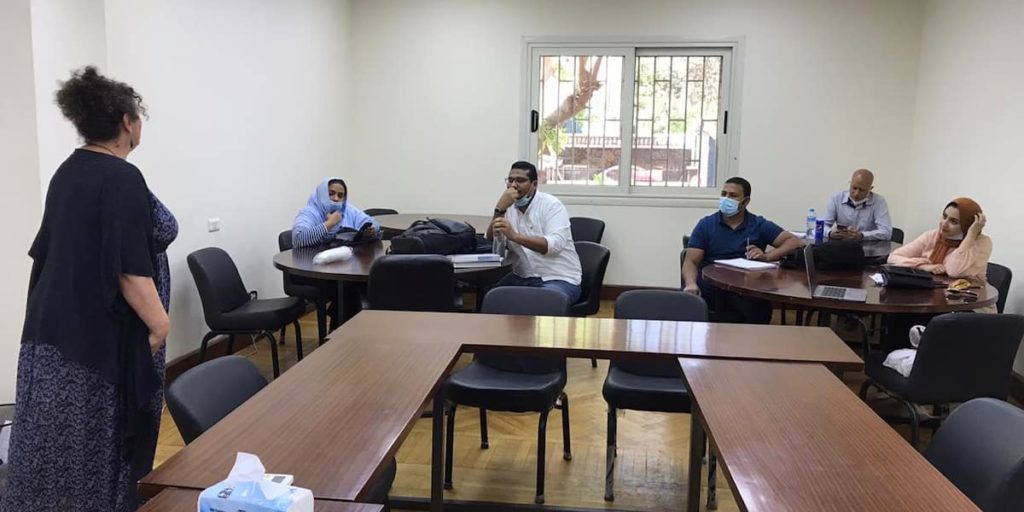IH Certificate in Teaching English (TEFL)
Course Objective
The 120-hour TEFL course offered at IH Cairo is a comprehensive program designed to provide participants with the necessary skills, knowledge, and practical experience to become effective English language teachers. The course is conducted at the International House Cairo, which is a renowned institution for language education and teacher training.
What does the course include?
- input sessions.
- 8 TPs.
- Assignments.
How long is the course:
Intensive face-to-face: 9 weeks.
Extensive face-to-to-face: 16 weeks.
Online: 10 weeks.

Course Objectives:
Develop a solid understanding of English language teaching principles:
the course aims to provide participants with a strong foundation in the theories, methodologies, and best practices of teaching English as a foreign language.
Gain practical teaching skills:
the course includes practical components, such as teaching practice sessions or micro-teaching, where participants have the opportunity to apply the teaching techniques they learn in real or simulated classroom settings.
Familiarize Ls with language teaching materials and resources:
the course introduces participants to various teaching materials, resources, and technologies that can be used to enhance language learning and engage learners effectively.
Learn classroom management techniques:
Effective classroom management is crucial for creating a positive and productive learning environment. The course covers strategies and techniques to manage classroom dynamics, create a supportive atmosphere, and promote student engagement.
Develop assessment and evaluation skills:
the course addresses assessment and evaluation techniques, including methods for assessing students' language proficiency, designing and grading assessments, and providing constructive feedback.
Understand cultural aspects and intercultural communication:
Given the diverse nature of English language learners, the course emphasizes the importance of cultural sensitivity and intercultural communication skills in language teaching.
Enhance professional development:
the course offers guidance on professional development opportunities, such as networking, continuing education, and career advancement within the field of English language teaching.
Tutors
The course is taught by DELTA qualified tutors.

Suitably qualified local tutors conduct the observations and the final portfolio is moderated by the OFQUAL institution.
The certificate is awarded to teachers who successfully complete the three areas of the course – coursework, the written assignments and teaching practice. The grading of the course is PassA, Pass B, Pass, and Fail.
Sessions Schedule
Week One
Course orientation and GTKY
Classroom Management: face to face and Online
How to teach receptive skills
Test-Teach-Test
Week Two
Text based presentation
Teaching Lexis: ECDW
How to write a lesson plan
Language analysis
TP1
Week Three
Concept checking questions
Phonology: The chart
Phonology 2: stress and intonation.
Situational presentation
TP2
Week Four
Controlled vs. Freer
How to teach Grammar
How to teach speaking
Phonology 3: connected speech
TP3
Week Five
How to teach functional language.
Error correction
How to teach writing
Gamification
TP4
Week Six
LA Conditional
How to teach speaking
Phonology 3: connected speech
TP5
Week Seven
How to teach writing
gamification
Dictation
LA Modals
TP6
Week Eight
Testing and teaching exams
Professional development
TP7
Week Nine
TP8
Face to face Course Calendar
Course Mode
Face to face
Course Schedule
2 Days/week
Course Days
Friday - Saturday
Course Time
9 a.m. to 5 p.m.
- 19th April 2024 to 15th June 2024
- 21th June 2024 to 17th August 2024
- 12th July 2024 to 7th September 2024
- 2nd August 2024 to 28th September 2024
- 25th October 2024 to 21st December 2024
- 21th April 2024 to 4th August 2024
- 9th June 2024 to 25th September 2024
- 4th August 2024 to 20th November 2024
Extensive Course Calendar
Course Mode
Face to face
Course Schedule
2 Days/week
Course Days
Sunday - Wednesday
Course Time
4 p.m. to 8 p.m.
Online Course Calendar
Course Mode
Online
Course Schedule
3 Days/week
Course Time
6 p.m. to 10 p.m.
Course Days
Saturday/Monday /Thursday
- 22nd April 2024 to 1st July 2024
- 8th July 2024 to 16th September 2024
- 23th September 2024 to 2nd December 2024
Course Info
- Structure & Assessment
- Time Commitment
- How to apply
- Course Fees
- The course is taught by qualified, experienced tutors who hold an online and face-to-face tutoring qualification. Suitably qualified local tutors conduct the observations and the final portfolio is moderated by the IH Assessment Unit.
- The certificate is awarded to teachers who successfully complete the three areas of the course – coursework, the written assignments and teaching practice. The grading of the course is Pass or Fail.
- The course consists of 120 hours of input and a minimum of 80 hours of homework and reading tasks.
- The course offered full-time and part-time on a face-to-face and online mode
- Click Apply Now on the chosen date from the Calendar below
- Our team will contact you if they have any questions about your application.
- Once your application is approved, we will be in touch to let you know how to pay.
- The course is offered face-to-face and online through Zoom
- You can choose between our part-time and full-time course
We offer various payment options for your convenience:
$400
OR 16000 EGP
plus £100 international certificate fees “optional”.
Course fees must be paid in full prior to the start date.
If you have any questions please send to: teachertraining@ihcairoeg.com


